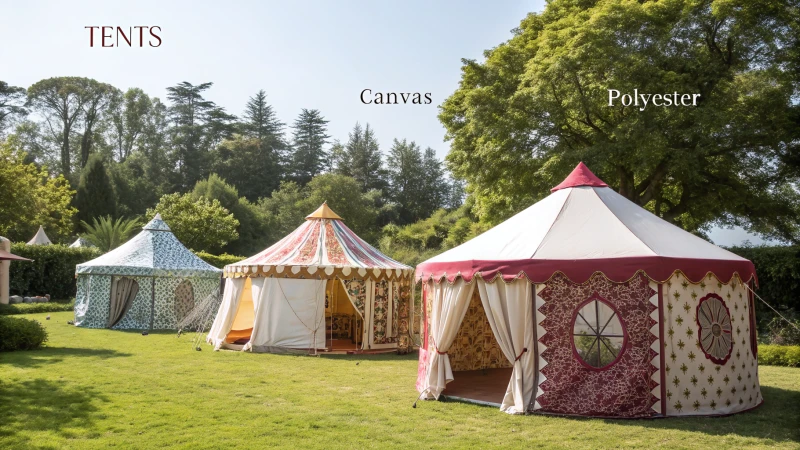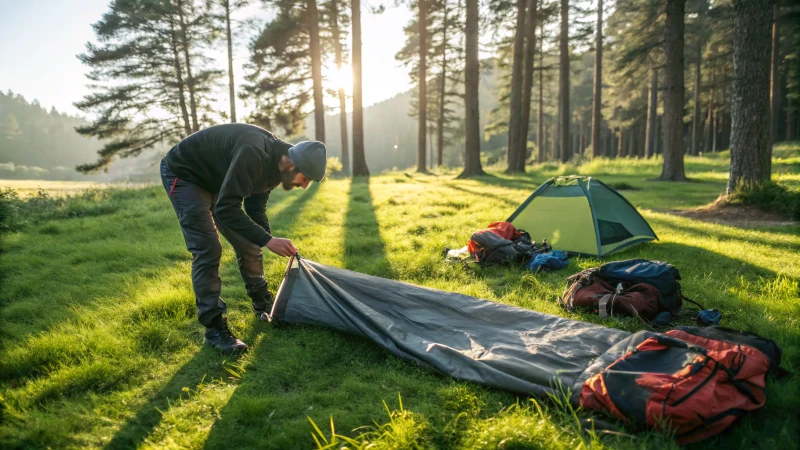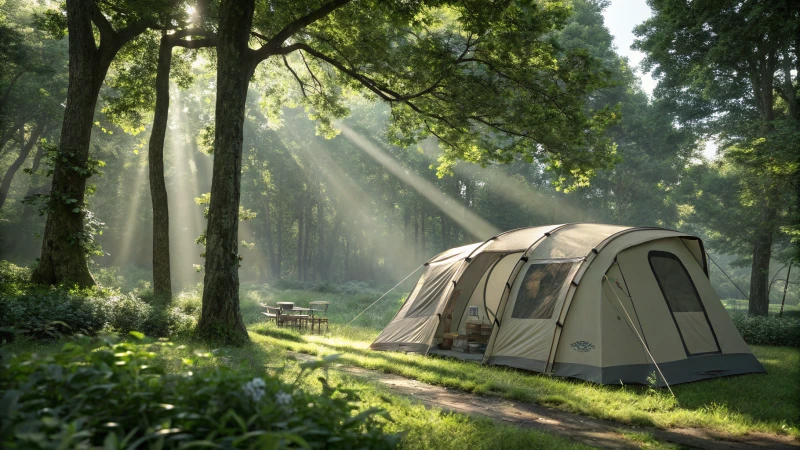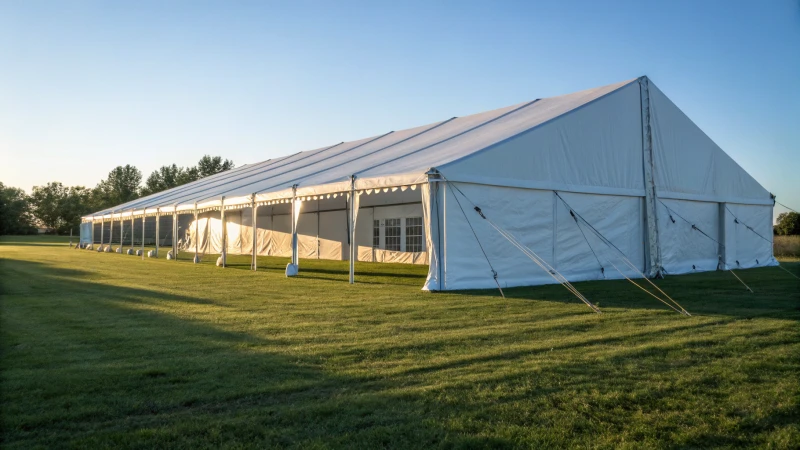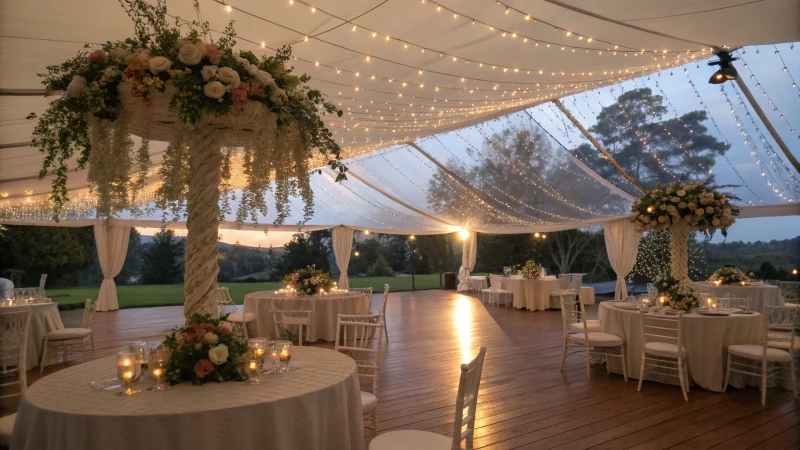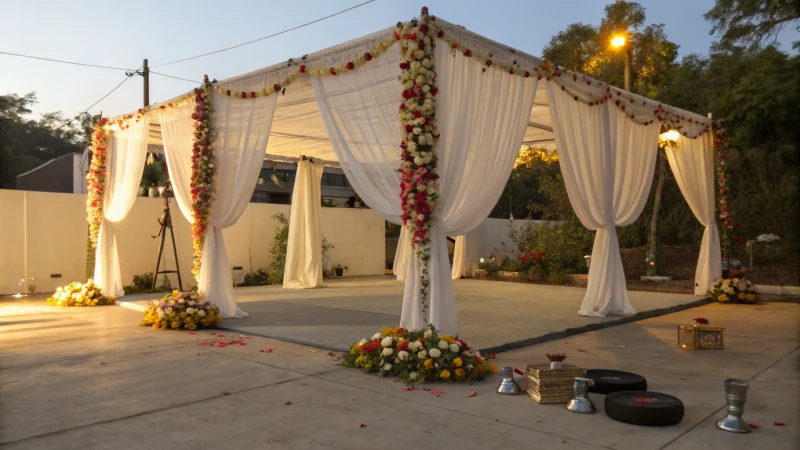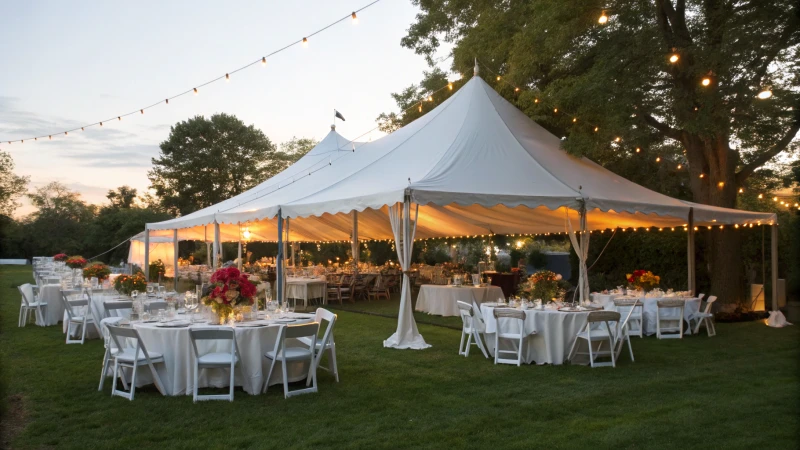
Remember the time you hosted an outdoor gathering, only to realize the tent was too cramped?
To comfortably accommodate 50 guests at an outdoor event, a 20ft x 30ft tent is ideal for round table seating. For rectangle table seating, a 20ft x 20ft tent works well. If seating isn’t needed, a 20ft x 20ft tent provides ample space for mingling.
I’ve been there, staring at a bare lawn, trying to visualize the perfect setup for my next big event. You want enough room for everyone to feel comfortable, but not so much that it feels like an empty hall. While these general guidelines offer a starting point, there are additional factors to consider. Think about the weather—is it going to be blazing hot or potentially rainy? And what about extras like dance floors or buffet tables? These elements can affect your tent size decision. Let’s dive into these details so you can host an unforgettable event.
A 20ft x 30ft tent fits 50 guests with round tables.True
This size accommodates seating arrangements for 50 guests comfortably.
A 20ft x 10ft tent is ideal for 50 guests mingling.False
A 20ft x 10ft tent is too small for mingling space for 50 guests.
How Do You Choose the Right Tent Size for Your Event?
Planning an event can be thrilling yet daunting, especially when it comes to choosing the right tent size. It’s not just about fitting everyone in—it’s about creating the perfect atmosphere for comfort and joy.
Choosing the right tent size involves considering guest count, seating arrangements, activities, weather conditions, and venue constraints to ensure a comfortable and functional event space.
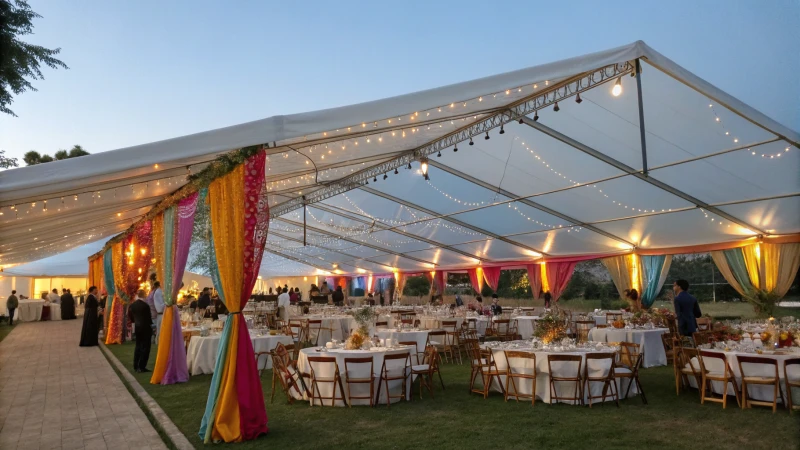
Guest Count and Seating Arrangements
I’ve hosted my fair share of outdoor events, and I’ve learned that the number of guests is the starting point for selecting the perfect tent size. A good rule of thumb I follow is to allow 10-12 square feet per person when planning seating. If you’re organizing a gathering for 50 people:
- Round Tables: These add a touch of elegance but require around 15 square feet per person.
- Rectangle Tables: These are more space-efficient, needing about 10 square feet per person.
Planned Activities
I’ve seen how quickly space can become cramped when additional activities are involved. Think about the dance floor where your guests can groove to their favorite tunes, or the buffet line where they’ll be lining up for those delicious bites. As a tip from experience, add around 20% more to your total tent area for these extras.
Weather Considerations
Weather can be an unpredictable guest at any outdoor event. I always recommend going slightly bigger with your tent size. This extra space can offer much-needed shelter from unexpected showers or wind. Plus, including sidewalls can give you that extra layer of protection.
Venue Constraints
Before you finalize anything, it’s crucial to walk the venue. I’ve encountered everything from awkwardly placed trees to uneven ground surfaces that have forced me to rethink my layout. Here’s what I look for:
- Obstacles: Trees, poles, or any permanent structures could affect setup.
- Ground Surface: Grass, concrete, or any uneven terrain can impact installation.
Example Calculation for a Wedding
Let’s imagine you’re planning a wedding with 100 guests using round tables and a dance floor:
| Element | Space per Person (sq ft) | Total Space (sq ft) |
|---|---|---|
| Seating | 15 | 1,500 |
| Dance Floor | 2.5 | 250 |
| Buffet | 1 | 100 |
| Total | 1,850 |
By considering these factors, you’ll ensure a comfortable and enjoyable experience for everyone involved. If you’re curious about different event tent styles1 or want to know more about tent materials2 that stand up to various weather conditions, there’s plenty to explore.
This guide gives you a solid starting point for choosing the right tent size for your event. For personalized advice tailored to your specific needs, I always recommend consulting with seasoned event planners.
Round tables require 10 square feet per person.False
Round tables typically require about 15 square feet per person.
Venue obstacles affect tent size selection.True
Obstacles like trees or poles can limit tent placement options.
How do different seating arrangements affect tent size?
Imagine orchestrating the perfect outdoor event, where every detail—from seating to tent size—fits together like a well-rehearsed symphony.
Different seating arrangements significantly impact the required tent size. Round tables, needing more space, influence your tent selection more than rectangular ones, which fit snugly in smaller areas.
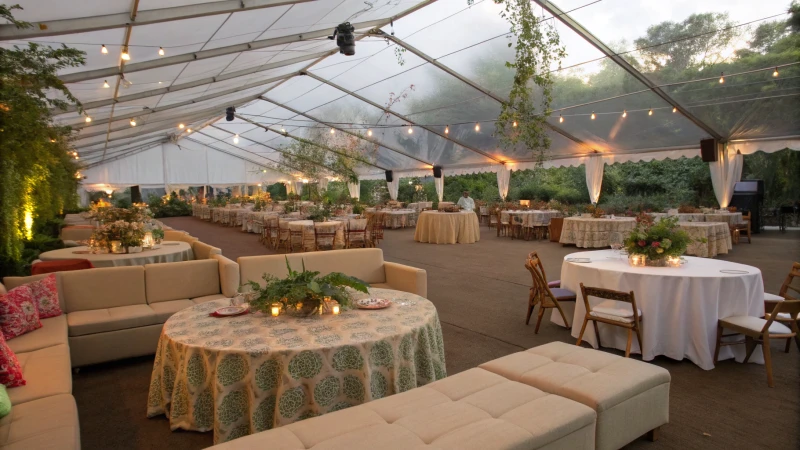
Impact of Seating Styles on Tent Dimensions
When I first started planning events, I was amazed at how much the choice of seating could alter the overall setup. Picture this: you’re envisioning a grand celebration under the stars, but the seating arrangement can either make or break the comfort and flow of your event. For example, round tables are lovely for encouraging conversation, but they demand more space—like a 20ft x 30ft tent for 50 guests. Rectangular tables, however, are more space-efficient, needing only a 20ft x 20ft tent for the same guest count.
Here’s a breakdown of how different seating styles affect tent dimensions:
| Seating Style | Guest Capacity | Tent Size Required |
|---|---|---|
| Round Tables | 50 guests | 20ft x 30ft |
| Rectangular | 50 guests | 20ft x 20ft |
| No Seating | 50 guests | 20ft x 20ft |
For events where mingling is key, like cocktail parties, I’ve found that reducing table sizes or opting for high-top bar tables3 creates a more dynamic space.
Considerations for Additional Space
Beyond just seating, think about all the other elements that add magic to your event—like a dance floor where your guests can let loose or a buffet area that invites culinary exploration. Adding these features often means expanding the tent size to ensure everyone feels comfortable and not cramped.
Whenever I’m unsure about the space needed, I turn to tent size calculators4. These tools have been lifesavers, offering tailored solutions based on guest count and table style. They help me align my vision with practical needs.
It’s all about planning ahead and consulting with professionals when necessary. Their insights5 can transform your event layout into a seamless experience, ensuring every guest enjoys the day as much as you will.
Round tables require more tent space than rectangular tables.True
Round tables need more space for the same number of guests.
A dance floor addition does not affect tent size.False
Adding a dance floor requires more tent space for comfort.
What Are the Benefits of Round vs. Rectangle Tables?
Every time I consider rearranging my dining area, I find myself pondering: round or rectangular table?
Round tables are great for promoting social interaction and making conversations flow naturally, while rectangular tables excel at maximizing space and seating more guests. Your choice will hinge on the size of your space, the vibe you’re going for, and what you plan to use it for.
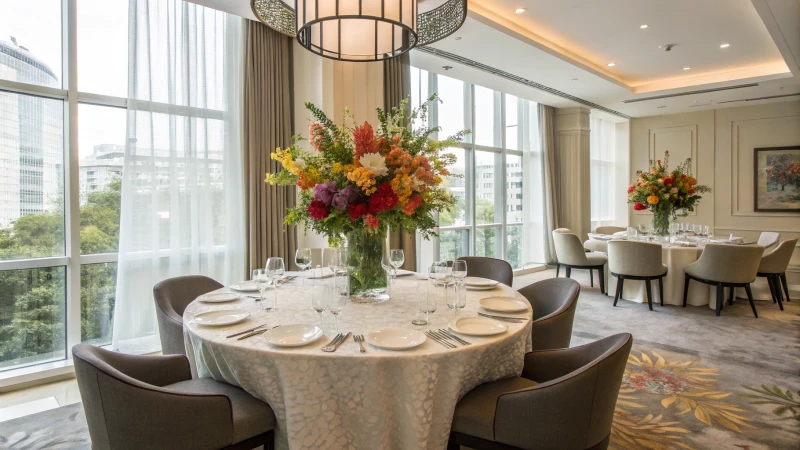
Round Tables: Enhancing Social Interaction
Every family gathering I host seems to revolve around stories and laughter, and I owe much of that to our round dining table. There’s something wonderfully democratic about having no "head" at the table, which naturally encourages everyone to join in and feel included. These tables are perfect for those small gatherings6 where I want each person to feel like they have an equal voice.
| Round Tables | Benefits |
|---|---|
| Shape | Encourages inclusion |
| Space Efficiency | Good for small spaces |
| Aesthetic Appeal | Softer look |
Because round tables don’t have sharp corners, they effortlessly fit into snug spaces, making them ideal for my compact dining room where every inch counts.
Rectangle Tables: Maximizing Space and Functionality
When I hosted my first big holiday dinner, I quickly realized the advantage of a rectangular table. Not only did it bring a sense of order and structure, but it also allowed me to fit more chairs comfortably around it. For events like business meetings7, where organized seating is key, rectangular tables are unbeatable.
| Rectangle Tables | Advantages |
|---|---|
| Seating Capacity | Can accommodate more |
| Space Utilization | Efficient in large areas |
| Flexibility | Various size options |
The flexibility in sizes makes these tables adaptable to almost any setting, whether they’re lined up against a wall or placed in the center of a large room. They truly make the most out of available space.
Choosing Based on Your Needs
When deciding which table shape is right for me, I think about my room’s dimensions and how I plan to use the table. For cozy, intimate dinners where everyone’s engaged in conversation, round tables are my go-to. But if I’m planning a larger gathering or need to prioritize seating arrangements, rectangle tables are the way forward.
Understanding these nuances helps me make an informed choice that complements my home’s style and fulfills its functional needs. Both shapes have their unique charm and serve different purposes beautifully.
Round tables enhance social interaction.True
Their shape encourages inclusive conversations without a head of the table.
Rectangle tables are less space-efficient than round ones.False
Rectangle tables efficiently utilize space, especially in larger areas.
How Do I Plan for Weather and Other Event Variables?
Ever felt the anxiety of watching a weather app while planning an outdoor event? I’ve been there too!
To tackle unpredictable weather at events, I start by checking long-term forecasts and preparing for any scenario. Sturdy tents, backup locations, and temperature control measures are essential. Staying flexible and communicating with vendors and guests is key to ensuring a smooth event.
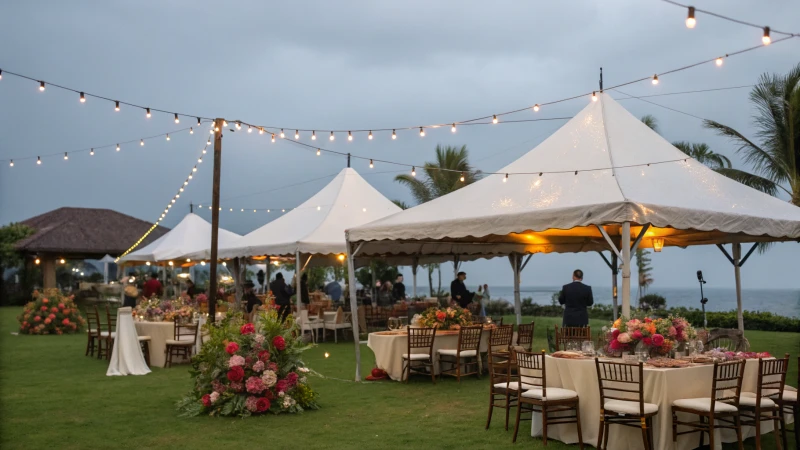
Check Long-term Weather Forecasts
Before jumping into the nitty-gritty of event planning, I always check the weather forecasts. It’s like checking the stars before a big journey! Reliable weather apps or websites give me a heads-up about potential weather changes8. I’m all about looking for patterns rather than pinning hopes on a single-day forecast.
Choose the Right Tent
Choosing the right tent feels like picking the perfect outfit for an unpredictable day—stylish yet functional. For me, tent materials9 that brave wind and rain are lifesavers. PVC-coated polyester is my go-to for durability.
| Tent Type | Features |
|---|---|
| Arcum Tent | Stylish, stable in windy areas |
| Marquee Tent | Traditional, versatile for all events |
| Dome Tent | Modern look, great for aesthetics |
Backup Locations
Having a backup location is my safety net. It could be a nearby indoor venue or even a larger tent setup. Early coordination with venue managers ensures I’m ready if the weather turns dramatic.
Temperature Control Measures
To keep everyone comfy, I consider renting portable heaters or fans. Hot climates need shaded areas and water aplenty. Temperature regulation10 is all about keeping smiles intact.
Flexibility and Communication
Open lines of communication are my best allies. Keeping vendors and guests in the loop about possible plan changes ensures we’re all on the same page. Updates through emails or a dedicated event app do wonders.
Insurance Coverage
Event insurance is like an umbrella in a storm, covering unforeseen circumstances like extreme weather. Evaluating event insurance options11 gives me peace of mind.
Navigating event variables feels like steering a ship through unpredictable waters. With careful planning and adaptability, every event can be a memorable success.
Long-term forecasts are more reliable than single-day forecasts.True
Long-term forecasts show trends, offering a broader weather pattern.
Arcum tents are unstable in windy conditions.False
Arcum tents are known for their stability in windy areas.
Conclusion
To host 50 guests comfortably, choose a 20ft x 30ft tent for round tables or a 20ft x 20ft tent for rectangular seating, considering weather and activities.
-
Explore various tent styles that suit different events, providing insights into design choices. ↩
-
Understand which tent materials offer durability and weather resistance for outdoor events. ↩
-
Bar tables create a casual atmosphere and save space, making them perfect for cocktail-style events where mingling is encouraged. ↩
-
Tent size calculators help determine space needs by considering guest count, seating arrangement, and additional elements like stages or dance floors. ↩
-
Professionals offer expertise in optimizing event layouts and ensuring all elements are considered for a successful event. ↩
-
Explore how round tables enhance interaction and create an inclusive atmosphere during small gatherings. ↩
-
Learn how rectangular tables facilitate organized seating and maximize space during business meetings. ↩
-
Understand trends in weather forecasts to better prepare for your event’s specific needs. ↩
-
Discover durable tent materials that can withstand diverse weather conditions. ↩
-
Explore options for keeping your event attendees comfortable in varying temperatures. ↩
-
Learn about insurance options that cover weather-related disruptions to events. ↩


